- Home
- Vladimir Nabokov
The Real Life of Sebastian Knight Page 5
The Real Life of Sebastian Knight Read online
Page 5
But it was raining too hard. We stood for a minute or two under the porch, and then I said I thought I'd better be going.
'Oh, look here,' called Sebastian's friend after me, as I was already picking my way among the puddles. 'I quite forgot to tell you. The Master told me the other day that somebody wrote to him asking whether Sebastian Knight had really been a Trinity man. Now, what was the fellow's name? Oh, bother…. My memory has shrunk in the washing. Well, we did give it a good rinsing, didn't we? Anyway, I gathered that somebody was collecting data for a book on Sebastian Knight. Funny, you don't seem to have – '
'Sebastian Knight?' – said a sudden voice in the mist. 'Who is speaking of Sebastian Knight?'
6
The stranger who uttered these words now approached – Oh, how I sometimes yearn for the easy swing of a well-oiled novel! How comfortable it would have been had the voice belonged to some cheery old don with long downy ear-lobes and that puckering about the eyes which stands for wisdom and humour…. A handy character, a welcome passer-by who had also known my hero, but from a different angle. 'And now,' he would say, 'I am going to tell you the real story of Sebastian Knight's college years.' And then and there He would have launched on that story. But alas, nothing of the kind really happened. That Voice in the Mist rang out in the dimmest passage of my mind. It was but the echo of some possible truth, a timely reminder: don't be too certain of learning the past from the lips of the present. Beware of the most honest broker. Remember that what you are told is really threefold: shaped by the teller, reshaped by the listener, concealed from both by the dead man of the tale. Who is speaking of Sebastian Knight? repeats that voice in my conscience. Who indeed? His best friend and his half-brother. A gentle scholar, remote from life, and an embarrassed traveller visiting a distant land. And where is the third party? Rotting peacefully in the cemetery of St Damier. Laughingly alive in five volumes. Peering unseen over my shoulder as I write this (although I dare say he mistrusted too strongly the commonplace of eternity to believe even now in his own ghost).
Anyway, here was I with the booty that friendship could yield. To this I added a few casual facts occurring in Sebastian's very short letters belonging to that period and the chance references to University life found scattered amongst his books. I then returned to London where I had neatly planned my next move.
At our last meeting Sebastian had happened to mention a kind of secretary whom he had employed from time to time between 1930 and 1934. Like many authors in the past, and as very few in the present (or perhaps we are simply unaware of those who fail to manage their affairs in a sound pushing manner), Sebastian was ridiculously helpless in business matters and once having found an adviser (who incidentally might be a shark or a blockhead – or both) he gave himself up to him entirely with the greatest relief. Had I perchance inquired whether he was perfectly certain that So-and-So now handling his affairs was not a meddlesome old rogue, he would have hurriedly changed the subject, so in dread was he that the discovery of another's mischief might force his own laziness into action. In a word he preferred the worst assistant to no assistant at all, and would convince himself and others that he was perfectly content with his choice. Having said all this I should like to stress .the fact as definitely as possible that none of my words are – from a legal point of view – slanderous, and that the name I am about to mention has not appeared in this particular paragraph.
Now what I wanted from Mr Goodman was not so much an account of Sebastian's last years – that I did not yet need – (for I intended to follow his life stage by stage without overtaking him), but merely to obtain a few suggestions as to what people I ought to see who might know something of Sebastian's post-Cambridge period.
So on 1 March 1936, I called on Mr Goodman at his office in Fleet Street. But before describing our interview I must be allowed a short digression.
Amongst Sebastian's letters I found as already mentioned some correspondence between him and his publisher dealing with a certain novel. It appears that in Sebastian's first book (1925), The Prismatic Bezel, one of the minor characters is an extremely comic and cruel skit upon a certain living author whom Sebastian found necessary to chastise. Naturally the publisher knew it immediately and this fact made him so uncomfortable that he advised Sebastian to modify the whole passage, a thing which Sebastian flatly refused to do, saying finally that he would get the book printed elsewhere – and this he eventually did.
'You seem to wonder', – he wrote in one letter, 'what on earth could make me, a budding author (as you say – but that is a misapplied term, for your authentic budding author remains budding all his life; others, like me, spring into blossom in one bound), you seem to wonder, let me repeat (which does not mean I am apologizing for that Proustian parenthesis), why the hell I should take a nice porcelain blue contemporary (X does remind one, doesn't he, of those cheap china things which tempt one at fairs to an orgy of noisy, destruction) and let him drop from the tower of my prose to the gutter below. You tell me he is widely esteemed; that his sales in Germany are almost as tremendous as his sales here; that an old story of his has just been selected for Modern Masterpieces; that together with Y and Z he is considered one of the leading writers of the "post-war" generation; and that, last but not least, he is dangerous as a critic. You seem to hint that we should all keep the dark secret of his success, which is to travel second-class with a third-class ticket – or if my simile is not sufficiently clear – to pamper the taste of the worst category of the reading public – not those who revel in detective yarns, bless their pure souls – but those who buy the worst banalities because they have been shaken' up in a modem way with a dash of Freud or "stream of consciousness" or whatnot – and incidentally do not and never will understand that the pretty cynics of today are Marie Corelli's nieces and old Mrs Grundy's nephews. Why should we keep that shameful secret? What is this masonic bond of triteness – or indeed tritheism? Down with these shoddy gods I And then you go and tell me that my "literary career" will be hopelessly handicapped from the start by my attacking an influential and esteemed writer. But even if there were such a thing as a "literary career" and I were disqualified merely for riding my own horse, still I would refuse to change one single word in what I have written. For, believe me, no imminent punishment can be violent enough to make me abandon the pursuit of my pleasure, especially when this pleasure is the firm young bosom of truth. There are in fact not many things in life comparable to the delight of satire, and when I imagine the humbug's face as he reads (and read he shall) that particular passage and knows as well as we do that it is the truth, then delight reaches its sweetest climax. Let me add that if I have faithfully rendered not only X's inner world (which is no more than a tube station during rush hours) but also his tricks of speech and demeanour, I emphatically deny that he or any other reader may discern the least trace of vulgarity in the passage which causes you such alarm. So do not let this haunt you any longer. Remember too that I take all responsibility, moral and commercial, in case you really "get into trouble" with my innocent little volume.'
My point in quoting this letter (apart from its own value as showing Sebastian in that bright boyish mood which later remained as a rainbow across the stormy gloom of his darkest tales) is to settle a rather delicate question. In a minute or two Mr Goodman will appear in flesh and blood. The reader already knows how thoroughly I disapprove of that gentleman's book. However, at the time of our first (and last) interview I knew nothing about his work (insofar as a rapid compilation may be called work). I approached Mr Goodman with an open mind; it is no longer open now, and naturally this is bound to influence my description. At the same time I do not very well see how I can discuss my visit to him without alluding even as discreetly as in the case of Sebastian's college friend, to Mr Goodman's manner if not appearance. Shall I be able to stop at that? Will not Mr Goodman's face suddenly pop out to the owner's rightful annoyance when he reads these lines? I have studied Sebastian's letter and arri
ved at the conclusion that what Sebastian Knight might permit himself in respect to Mr X is denied me in regard to Mr Goodman. The frankness of Sebastian's genius cannot be mine, and I should only succeed in being rude there where he might have been brilliant. So that I am treading on very thin ice and must try to step warily as I enter Mr Goodman's study.
'Pray be seated,' he said, courteously waving me into a leather armchair near his desk. He was remarkably well-dressed though decidedly with a city flavour. A black mask covered his face. 'What can I do for you?' He went on looking at me through the eyeholes and still holding my card.
I suddenly realized that my name conveyed nothing to him. Sebastian had made his mother's name his own completely.
'I am,' I answered, 'Sebastian Knight's half-brother.' There was a short silence.
'Let me see,' said Mr Goodman, 'am I to understand, that you are referring to the late Sebastian Knight, the well-known author?'
'Exactly,' said I.
Mr Goodman with finger and thumb stroked his face…. I mean the face under his mask… stroked it down, down, reflectively.'
'I beg your pardon,' he said, 'but are you quite sure that there is not some mistake?'
'None whatever,' I replied, and in as few words as possible I explained my relationship to Sebastian.
'Oh, is that so?' said Mr Goodman, growing more and more pensive. 'Really, really, it never entered my head. I was certainly quite aware that Knight was born and brought up in Russia. But I somehow missed the point about his name. Yes, now I see… Yes, it ought to be a Russian one…. His mother….'
Mr Goodman drummed the blotting-pad for a minute with his fine white fingers and then faintly sighed.
'Well, what's done is done,' he remarked. 'Too late now to add a… I mean,' he hurriedly continued, 'that I'm sorry not to have gone into the matter before. So you are his half-brother? Well, I am delighted to meet you.'
'First of all,' I said, 'I should like to settle the business question. Mr Knight's papers, at least those that refer to his literary occupations, are not in very great order and I don't quite know exactly how things stand. I haven't yet seen his publishers, but I gather that at least one of them – the firm that brought out The Funny Mountain – no longer exists. Before going further into the matter I thought I'd better have a talk with you.'
'Quite so,' said Mr Goodman. 'As a matter of fact you may not be cognizant of my having interest in two Knight books, The Funny Mountain and Lost Property. Under the circumstances the best thing would be for me to give you some details which I can send you by letter tomorrow morning as well as a copy of my contract with Mr Knight. Or should I call him Mr…' and smiling under his mask Mr Goodman tried to pronounce our simple Russian name.
'Then there is another matter,' I continued. 'I have decided to write a book on his life and work, and I sorely need certain information. Could you perhaps….'
It seemed to me that Mr Goodman stiffened Then he coughed once or twice and even went as far as to select a blackcurrant lozenge from a small box on his distinguished-looking desk.
'My dear Sir,' he said, suddenly veering together with his seat and whirling his eyeglass on his ribbon. 'Let us be perfectly outspoken. I have certainly known poor Knight better than anyone else, but… look here, have your started writing that book?'
'No,' I said
'Then don't. You must excuse my being so very blunt. An old habit – a bad habit, perhaps. You don't mind, do you? Well, what I mean is… how should I put it?… You see, Sebastian Knight was not what you might call a great writer…. Oh, yes, I know – a fine artist and all that – but with no appeal to the general public. I don't wish to say that a book could not be written about him. It could. But then it ought to be written from a special point of view which would make the subject fascinating. Otherwise it is bound to fall flat, because, you see, I really don't think that Sebastian Knight's fame is strong enough to sustain anything like the work you are contemplating.'
I was so taken aback by this outburst that I kept silent. And Mr Goodman went on:
'I trust my bluntness does not offend you. Your half-brother and I were such good pals that you quite understand how I feel about it. Better not, my dear sir, better not. Leave it to some professional fellow, to one who knows the book-market – and he will tell you that anybody trying to complete an exhaustive study of Knight's life and work, as you put it, would be wasting his and the reader's time. Why, even So-and-So's book about the late… [a famous name was mentioned] with all those photographs and facsimiles did not sell.'
I thanked Mr Goodman for his advice and reached for my hat. I felt he had proved a failure and that I had followed a false scent. Somehow or other I did not care to ask him to enlarge upon those days when he and Sebastian had been 'such pals'. I wonder now what his answer would have been had I begged him to tell me the story of his secretaryship. After shaking hands with me most cordially, he returned the black mask which I pocketed, as I supposed it might come in usefully on some other occasion. He saw me to the nearest glass door and there we parted. As I was about to go down the stairs, a vigorous-looking girl whom I had noticed steadily typing in one of the rooms ran after me and stopped me (queer – that Sebastian's Cambridge friend had also called me back).
'My name,' she said, 'is Helen Pratt. I have overheard as much of your conversation as I could stand and there is a little thing I want to ask you. Clare Bishop is a great friend of mine. There's something she wants to find out. Could I talk to you one of these days?'
I said yes, most certainly, and we fixed the time.
'I knew Mr Knight quite well,' she added, looking at me with bright round eyes.
'Oh, really,' said I, not quite knowing what else to say.
'Yes,' she went on, 'he was an amazing personality, and I don't mind telling you that I loathed Goodman's book about him.'
'What do you mean?' I asked. 'What book?'
'Oh, the one he has just written. I was going over the proofs with him this last week. Well, I must be running. Thank you so much.'
She darted away and very slowly I descended the steps. Mr Goodman's large soft pinkish face was, and is, remarkably like a cow's udder.
7
Mr Goodman's book The Tragedy of Sebastian Knight has enjoyed a very good Press. It has been lengthily reviewed in the leading dailies and weeklies. It has been called 'impressive and convincing'. The author has been credited with 'deep insight' into an 'essentially modem' character. Passages have been quoted to demonstrate his efficient handling of nutshells. One critic even went as far as to take his hat off to Mr Goodman – who, let it be added, had used his own merely to talk through it. In a word, Mr Goodman has been patted on the back when he ought to have been rapped on the knuckles.
I, for one, would have ignored that book altogether had it been just another bad book, doomed with the rest of its kind to oblivion by next spring. The Lethean Library, for all its incalculable volumes, is, I know, sadly incomplete without Mr Goodman's effort. But bad as the book may be, it is something else besides. Owing to the quality of its subject, it is bound to become quite mechanically the satellite of another man's enduring fame. As long as Sebastian Knight's name is remembered, there always will be some learned inquirer conscientiously climbing up a ladder to where The Tragedy of Sebastian Knight keeps half awake between Godfrey Goodman's Fall of Man and Samuel Goodrich's Recollections of a Lifetime. Thus, if I continue to harp on the subject, I do so for Sebastian Knight's sake.
Mr Goodman's method is as simple as his philosophy. His sole object is to show 'poor Knight' as the product and victim of what he calls 'our time' – though why some people are so keen to make others share in their chronometric concepts, has always been a mystery to me. 'Post-war Unrest'. 'Post-war Generation' are to Mr Goodman magic words opening every door. There is, however, a certain kind of 'open sesame' which seems less a charm than a skeleton-key, and this, I am afraid, is Mr Goodman's kind. But he is quite wrong in thinking that he found something once
the lock had been forced. Not that I wish to suggest that Mr Goodman thinks. He could not if he tried. His book concerns itself only with such ideas as have been shown (commercially) to attract mediocre minds.
For Mr Goodman, young Sebastian Knight 'freshly emerged from the carved chrysalid of Cambridge' is a youth of acute sensibility in a cruel cold world. In this world, 'outside realities intrude so roughly upon one's most intimate dreams' that a young man's soul is forced into a state of siege before it is finally shattered. 'The War', says Mr Goodman without so much as a blush, 'had changed the face of the universe.' And with much gusto he goes on to describe those special aspects of post-war life which met a young man at 'the troubled dawn of his career': a feeling of some great deception; weariness of the soul and feverish physical excitement (such as the 'vapid lewdness of the foxtrot'); a sense of futility – and its result: gross liberty. Cruelty, too; the reek of blood still in the air; glaring picture palaces; dim couples in dark Hyde Park; the glories of standardization; the cult of machinery; the degradation of Beauty, Love, Honour, Art… and so on. It is really a wonder that Mr Goodman himself who, as far as I know, was Sebastian's coeval, managed to live through those terrific years.
But what Mr Goodman could stand, his Sebastian Knight apparently could not. We are given a picture of Sebastian restlessly pacing the rooms of his London flat in .1923, after a short trip to the Continent, which Continent 'shocked him indescribably by the vulgar glamour of its gambling hells'. Yes, 'pacing up and down… clutching at his temples… in a passion of discontent… angry with the world… alone… eager to do something, but weak, weak….' The dots are not Mr Goodman's tremolos, but denote sentences I have kindly left out. 'No,' Mr Goodman goes on, 'this was not the world for an artist to live in. It was all very well to flaunt a brave countenance, to make a great display of that cynicism which so irritates one in Knight's earlier work and so pains one in his last two volumes… it was all very well to appear contemptuous and ultrasophisticated, but the thorn was there, the sharp, poisonous thorn.' I don't know why, but the presence of this (perfectly mythical) thorn seems to give Mr Goodman a grim satisfaction.

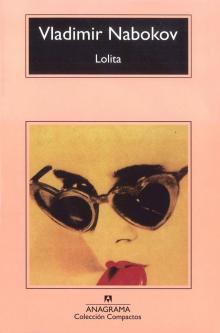 Lolita
Lolita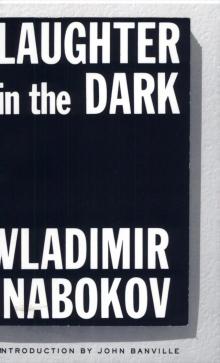 Laughter in the Dark
Laughter in the Dark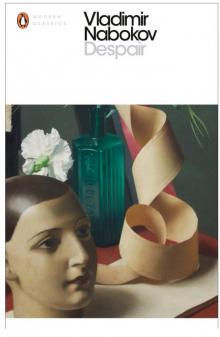 Despair
Despair Mary
Mary The Enchanter
The Enchanter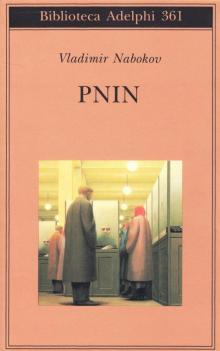 Pnin
Pnin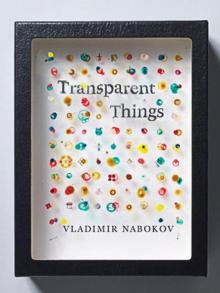 Transparent Things
Transparent Things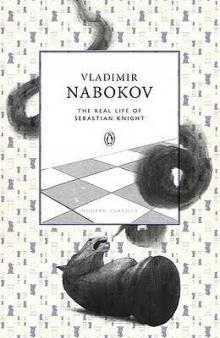 The Real Life of Sebastian Knight
The Real Life of Sebastian Knight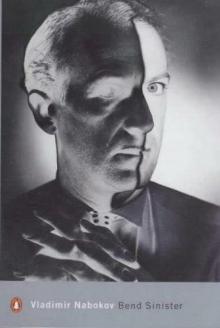 Bend Sinister
Bend Sinister Invitation to a Beheading
Invitation to a Beheading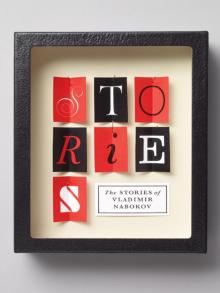 The Stories of Vladimir Nabokov
The Stories of Vladimir Nabokov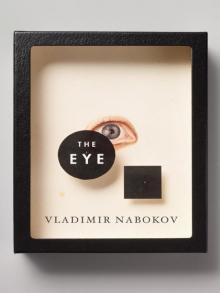 The Eye
The Eye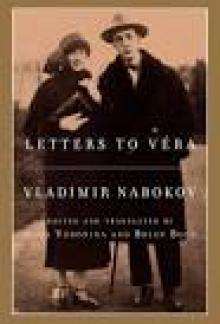 Letters to Véra
Letters to Véra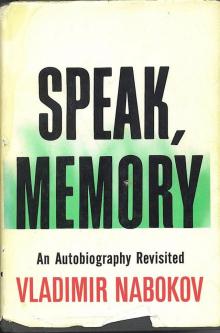 Speak, Memory
Speak, Memory The Gift
The Gift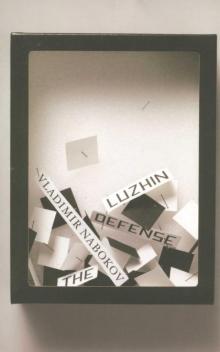 The Luzhin Defense
The Luzhin Defense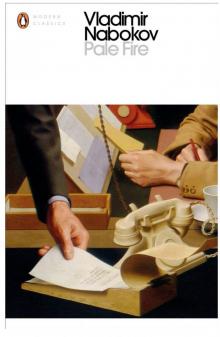 Pale Fire
Pale Fire Glory
Glory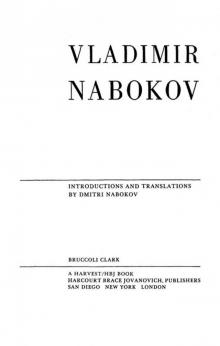 Man From the USSR & Other Plays
Man From the USSR & Other Plays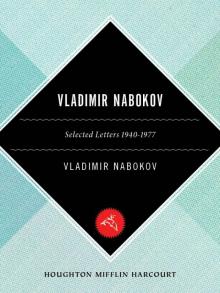 Vladimir Nabokov: Selected Letters 1940-1977
Vladimir Nabokov: Selected Letters 1940-1977 Strong opinions
Strong opinions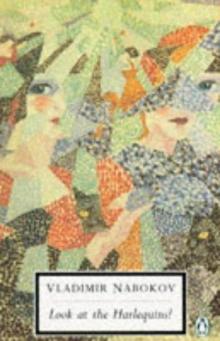 Look at the Harlequins!
Look at the Harlequins!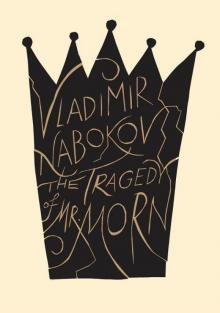 The Tragedy of Mister Morn
The Tragedy of Mister Morn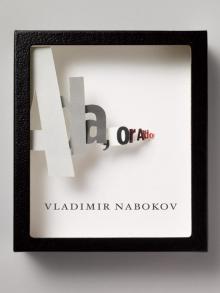 Ada, or Ardor
Ada, or Ardor Lectures on Russian literature
Lectures on Russian literature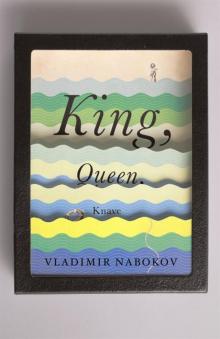 King, Queen, Knave
King, Queen, Knave The Original of Laura
The Original of Laura